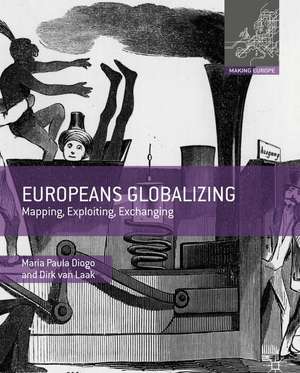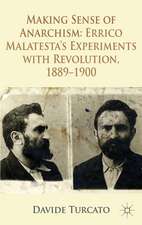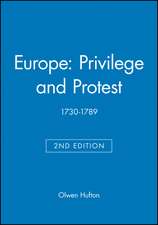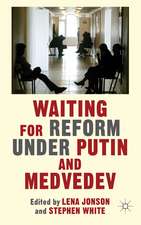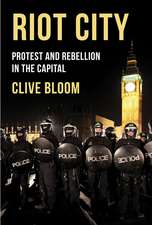Europeans Globalizing: Mapping, Exploiting, Exchanging: Making Europe
Autor Maria Paula Diogo, Dirk van Laaken Limba Engleză Paperback – 10 aug 2018
| Toate formatele și edițiile | Preț | Express |
|---|---|---|
| Paperback (1) | 214.18 lei 6-8 săpt. | |
| Palgrave Macmillan UK – 10 aug 2018 | 214.18 lei 6-8 săpt. | |
| Hardback (1) | 584.38 lei 3-5 săpt. | |
| Palgrave Macmillan UK – 23 sep 2016 | 584.38 lei 3-5 săpt. |
Preț: 214.18 lei
Nou
Puncte Express: 321
Preț estimativ în valută:
40.98€ • 42.79$ • 33.92£
40.98€ • 42.79$ • 33.92£
Carte tipărită la comandă
Livrare economică 05-19 aprilie
Preluare comenzi: 021 569.72.76
Specificații
ISBN-13: 9780230279643
ISBN-10: 0230279643
Pagini: 312
Ilustrații: XX, 352 p.
Dimensiuni: 189 x 246 mm
Greutate: 0.67 kg
Ediția:1st ed. 2016
Editura: Palgrave Macmillan UK
Colecția Palgrave Macmillan
Seria Making Europe
Locul publicării:London, United Kingdom
ISBN-10: 0230279643
Pagini: 312
Ilustrații: XX, 352 p.
Dimensiuni: 189 x 246 mm
Greutate: 0.67 kg
Ediția:1st ed. 2016
Editura: Palgrave Macmillan UK
Colecția Palgrave Macmillan
Seria Making Europe
Locul publicării:London, United Kingdom
Cuprins
Introduction
1. Europeans Mapping and being Mapped
2. Europe's Significant Others
3. Wars and Peace at Home and Abroad
4. Scrambling for Eurafrica: Resources and Axes of Infrastructure
5. From the Raj to the Yellow Peril
6. A New World Order and the Collapse of Colonialism
7. The Reconstruction Period
1. Europeans Mapping and being Mapped
2. Europe's Significant Others
3. Wars and Peace at Home and Abroad
4. Scrambling for Eurafrica: Resources and Axes of Infrastructure
5. From the Raj to the Yellow Peril
6. A New World Order and the Collapse of Colonialism
7. The Reconstruction Period
Recenzii
“Europeans Globalizing is part of an ambitious research agenda that questions Europe’s history through a transnational history of technology. … the range and scope of the book as well as the thoughtfulness with which the authors discuss their disparate topics are impressive. … the transnational approach provides a refreshing perspective on Europe’s identity and connections to the world. It is a welcome and important contribution to the literature on Europe’s place in the technological Great Divergence.” (Marten Boon, EuropeNow Journal, europenowjournal.org, April, 2017)
Notă biografică
Maria Paula Diogo is Full Professor of History of Technology and Engineering at the Faculty of Science and Technology, New University of Lisbon (FCT/NOVA), Portugal, and member of the Centre for the History of Science and Technology (CIUHCT). She has pioneered the study of Portuguese engineering and engineers in the early 90s and is currently working on engineering and the Portuguese colonial agenda, as well as the role of technology in European history, particularly in peripheral countries. She publishes on a regular basis both nationally and internationally. She is a member of several societies and international research networks.
Dirk van Laak is Full Professor of Contemporary History at the History Department, Justus Liebig University Giessen, Germany. He has worked on German, European, colonial and global history, as well as the history of technology and intellectual history. He also pioneered the history of infrastructures, and most recently devoted himself to a cultural and everyday history of public works. He has published and (co)edited several books on a wide range of topics.
Dirk van Laak is Full Professor of Contemporary History at the History Department, Justus Liebig University Giessen, Germany. He has worked on German, European, colonial and global history, as well as the history of technology and intellectual history. He also pioneered the history of infrastructures, and most recently devoted himself to a cultural and everyday history of public works. He has published and (co)edited several books on a wide range of topics.
Textul de pe ultima copertă
Over the course of 150 years, Europe's protean technologies inspired and underpinned the globalizing ambitions of European nations. This book aims to show how technology mediated European influence in the rest of the world and how this mediation in turn transformed Europeans. Europeans mapped, they exploited, and they exchanged - their interactions ranged from technological and biological genocide to treaties of cooperation and the construction of elaborate colonial infrastructures. Quite aside from the enormous variety of political settings, cultures and colonial programs, interrelations created dependencies on both sides. Cultural transfers were rarely unidirectional, and often a kind of Pidgin-knowledge emerged, a hybrid fusion of European and local knowledge and skills. As observers have rightly pointed out, Europe played both the role of 'Prometheus unbound' and the 'Sorcerer's apprentice'.
